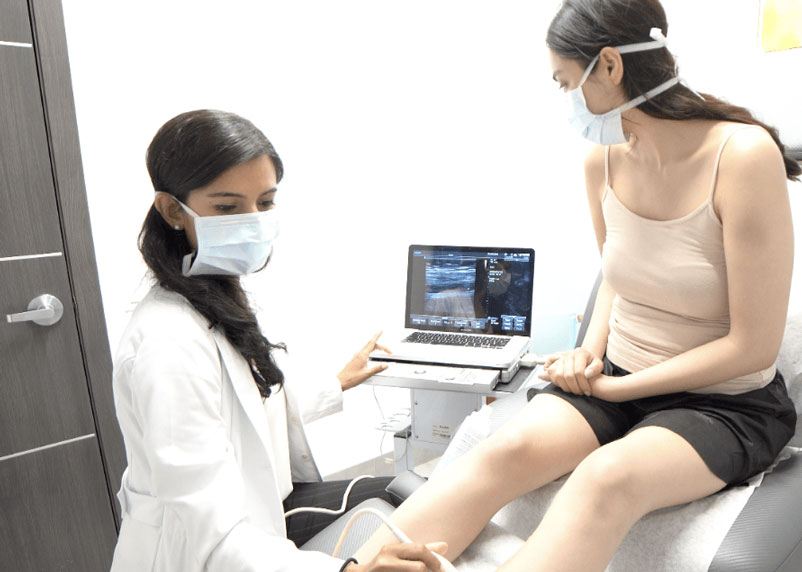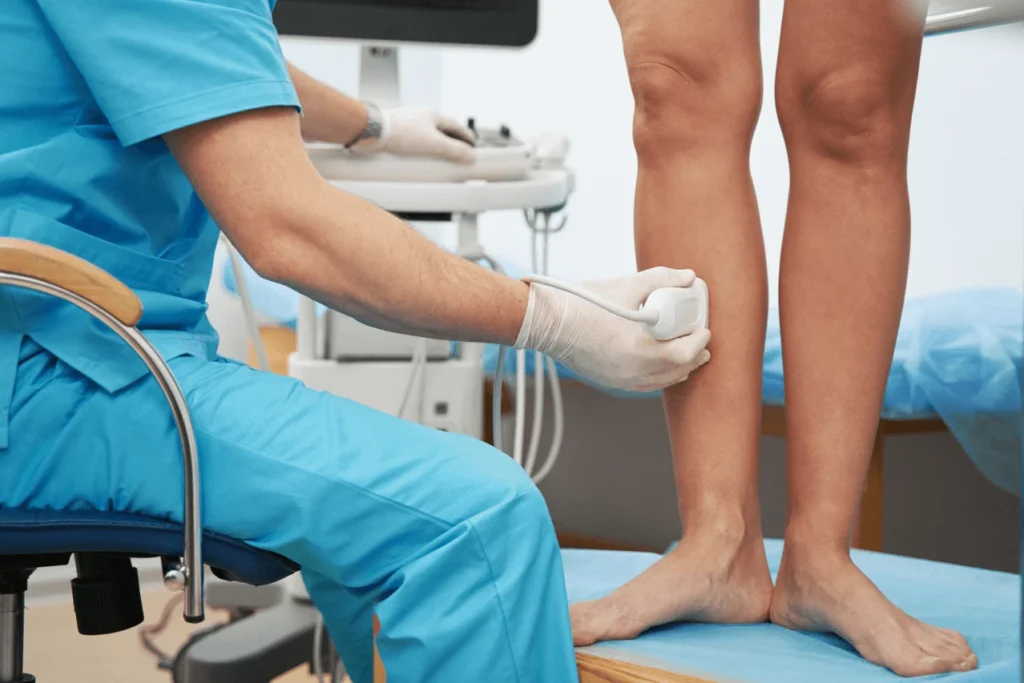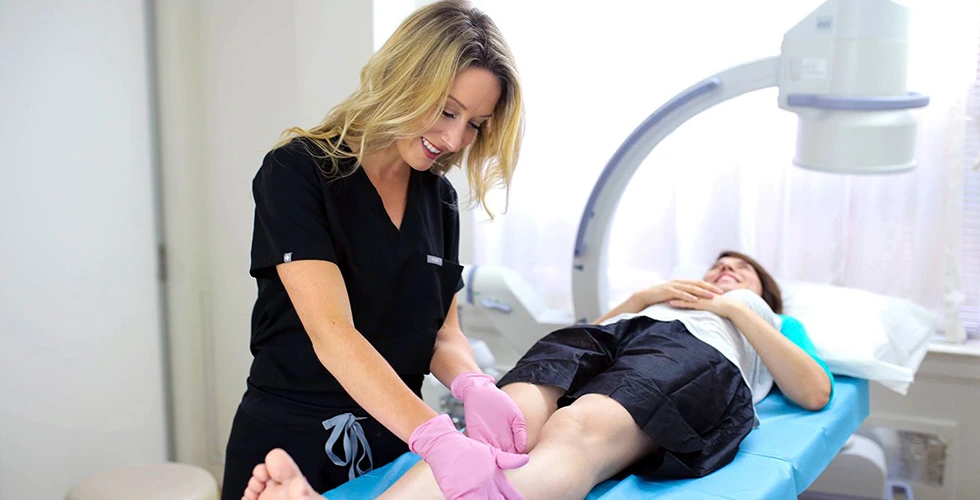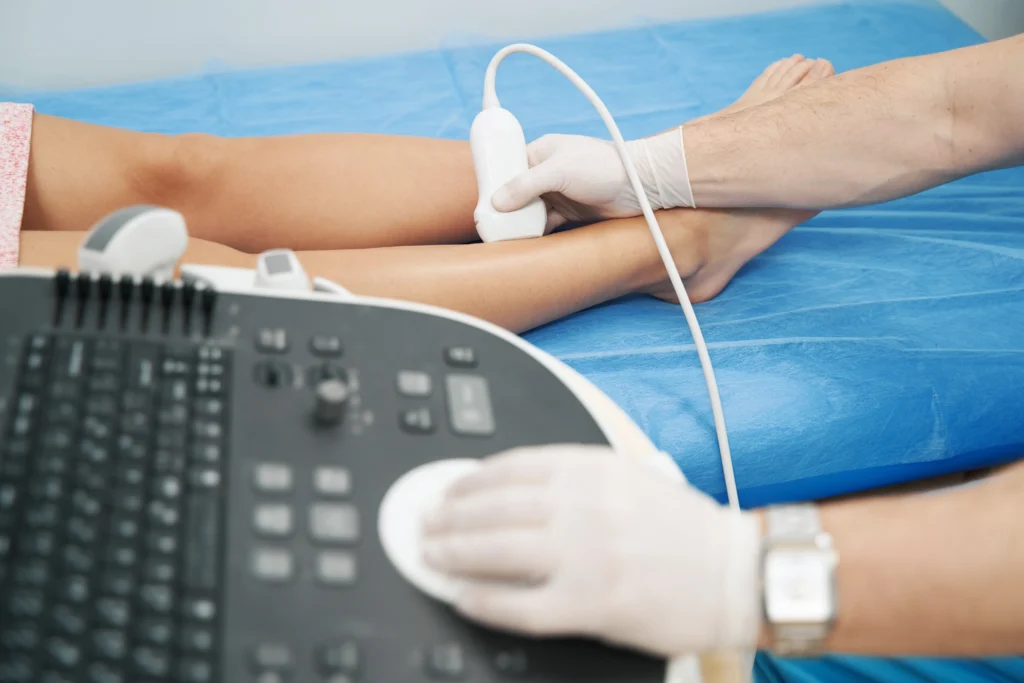Varicose veins are a common condition in which the veins in your legs become enlarged, twisted, and bulge out from the surface of the skin. This occurs when the valves in the veins that help to regulate blood flow become weak or damaged. Varicose veins are usually not a serious medical issue, but they can cause discomfort, pain, and cosmetic concerns. If left untreated, varicose veins can also lead to more severe health complications.
At Maryland Vein Clinic, we are a team of board-certified vein doctors who specialize in diagnosing and treating venous diseases. We offer minimally invasive treatments, such as sclerotherapy, endovenous laser ablation, radiofrequency ablation, VenaSeal, ClariVein, and ambulatory phlebectomy, to treat spider veins and varicose veins. Before curating a personalized treatment plan, we always diagnose the root cause of the venous disease via duplex ultrasound.
In this article, we will discuss what happens if varicose veins are left untreated and the potential complications that can arise from untreated varicose veins.
What Causes Varicose Veins?
There are several factors that can contribute to the development of varicose veins:
- Age: As we age, the valves in our veins can become weaker, causing blood to pool in the veins and leading to the development of varicose veins.
- Gender: Women are more likely than men to develop varicose veins, likely due to hormonal factors.
- Pregnancy: During pregnancy, the increased pressure on the veins can cause varicose veins to develop.
- Family history: If other members of your family have had varicose veins, you may be more likely to develop them.
- Obesity: Being overweight puts extra pressure on your veins, which can contribute to the development of varicose veins.
- Standing or sitting for long periods: Jobs that require prolonged periods of standing or sitting can increase the risk of developing varicose veins.

Symptoms of Untreated Varicose Veins
Untreated varicose veins can cause several symptoms, including:
- Pain or discomfort in the affected area
- Swelling in the legs or ankles
- Itching or burning sensations
- Leg cramps or muscle spasms
- Skin discoloration or texture changes
- Ulcers or sores on the skin
Complications of Untreated Varicose Veins
If left untreated, varicose veins can lead to more severe health complications:
- Chronic Venous Insufficiency: Chronic venous insufficiency (CVI) occurs when the valves in the veins are damaged or weakened to the point that they cannot properly regulate blood flow. This can lead to the buildup of blood in the veins, causing the veins to become swollen and painful. Over time, CVI can cause skin changes, ulcers, and infections in the affected area.
- Deep Vein Thrombosis (DVT): Deep vein thrombosis (DVT) is a condition in which a blood clot forms in one of the deep veins in the body, most commonly in the legs. DVT can be a serious medical condition that requires immediate treatment. If a blood clot breaks off and travels to the lungs, it can cause a pulmonary embolism, which can be life-threatening.
- Varicose Veins in the Chest: Untreated varicose veins can occur in the chest area. These veins can become enlarged and painful, leading to discomfort and difficulty breathing. This condition is known as superior vena cava syndrome and requires prompt medical attention.
- Bleeding: Varicose veins close to the surface of the skin can become fragile and easily irritated. If left untreated, they can rupture and cause bleeding. While the bleeding is usually minor, it can be difficult to stop, and in rare cases, it may require medical attention.
- Superficial Thrombophlebitis: Superficial thrombophlebitis is a condition in which the veins close to the surface of the skin become inflamed and form blood clots. This can cause pain, swelling, and redness in the affected area. Superficial thrombophlebitis can lead to complications such as infection or the formation of deeper blood clots.
- Skin Ulcers: Untreated varicose veins can cause skin ulcers, which are open sores that develop on the skin. These ulcers can be painful and difficult to heal. Skin ulcers can become infected, leading to additional complications.
- Lymphedema: Lymphedema is a condition in which fluid accumulates in the tissues, causing swelling in the affected area. Untreated varicose veins can contribute to the development of lymphedema, which can be a chronic condition that requires ongoing management.
Treatment for Varicose Veins
If you are experiencing symptoms of varicose veins, it is important to seek treatment from a vein specialist. At Maryland Vein Clinic, we offer minimally invasive treatments that can effectively treat varicose veins and relieve symptoms. Sclerotherapy is a minimally invasive procedure in which a solution is injected directly into the affected vein, causing it to collapse and eventually disappear. This treatment is often used for smaller varicose veins and spider veins.
Endovenous laser ablation and radiofrequency ablation are procedures that use heat energy to destroy the affected vein, causing it to collapse and seal shut. This treatment is often used for larger varicose veins. VenaSeal and ClariVein are procedures that use a medical adhesive to close the affected vein. These treatments do not require the use of heat energy and are often used for patients who are not good candidates for other types of minimally invasive procedures.
Ambulatory phlebectomy is a minimally invasive surgical procedure that involves making small incisions in the skin and removing the affected vein through the incisions.
Should Varicose Veins Be Removed?
Whether or not to remove varicose veins is a personal decision that should be made in consultation with a vein specialist. In many cases, treatment is not necessary if the varicose veins are not causing symptoms or cosmetic concerns. However, if varicose veins are causing discomfort, pain, or other symptoms, treatment may be recommended.
Can Varicose Veins Heal?
Varicose veins cannot heal on their own. Once the veins become damaged, they will not return to their normal state without treatment. However, with proper treatment, varicose veins can be effectively treated and symptoms can be relieved.
Conclusion
Varicose veins are a common condition that can cause discomfort, pain, and cosmetic concerns. If left untreated, varicose veins can lead to more severe health complications. At Maryland Vein Clinic, we offer minimally invasive treatments that can effectively treat varicose veins and relieve symptoms. If you are experiencing symptoms of varicose veins, it is important to seek treatment from a vein specialist. Contact us today to schedule a consultation with one of our board-certified vein doctors. We offer free insurance verification before the first appointment.
Don’t ignore your symptoms.
At Vein Treatment Clinic, we’re here for Maryland patients with expert vein doctors and convenient locations close to home.
Whether you’re in Bethesda, Bowie, or Maple Lawn, you’ll find advanced care for spider veins, varicose veins, and chronic venous insufficiency at our clinics.
Patients across Maryland trust our Ivy League–trained, board-certified specialists for minimally invasive treatments that improve circulation, relieve pain, and restore confidence. In Maryland, our team includes Dr. Kamran Saraf and Dr. Lisa Alford, two highly experienced vein experts dedicated to providing personalized care.
Book your consultation today at the clinic nearest you.





